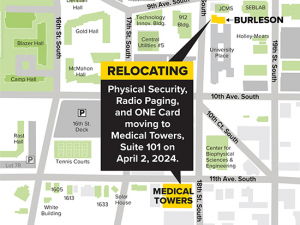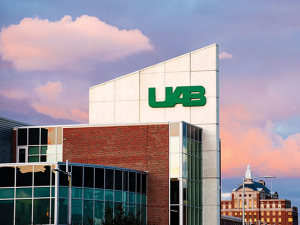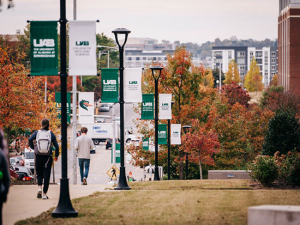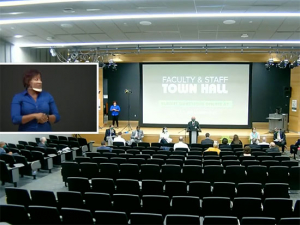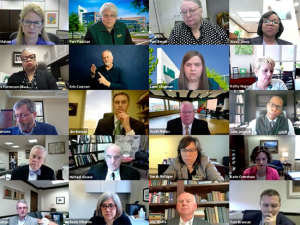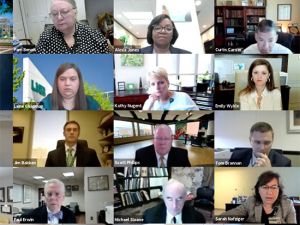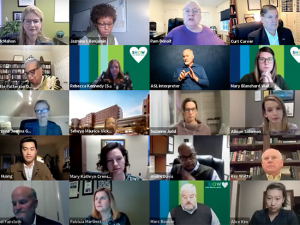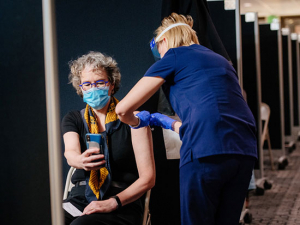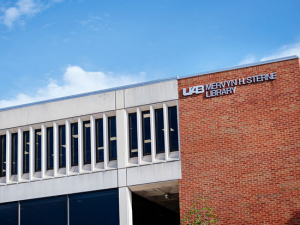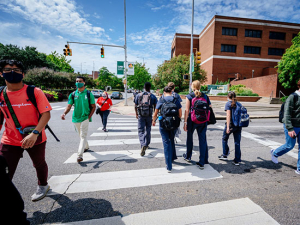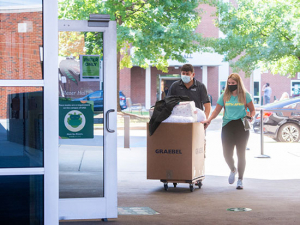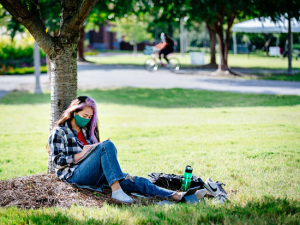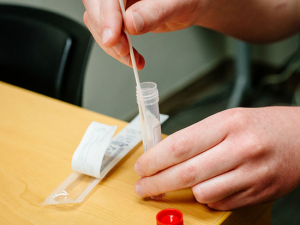 Professor John Mayer, Ph.D., associate chair of mathematics and co-director of UABTeach, also is immediate Past Chair of the Faculty. He wrote this for the UAB Reporter.It has been an eventful year for UAB, not the least event being the return of UAB Football. But that is not an accomplishment of the UAB Faculty Senate, but rather of the entire local and UAB community. Meanwhile much of the work of the senate goes along quietly.
Professor John Mayer, Ph.D., associate chair of mathematics and co-director of UABTeach, also is immediate Past Chair of the Faculty. He wrote this for the UAB Reporter.It has been an eventful year for UAB, not the least event being the return of UAB Football. But that is not an accomplishment of the UAB Faculty Senate, but rather of the entire local and UAB community. Meanwhile much of the work of the senate goes along quietly.
Much of the work of the senate is done through its standing committees, not on the floor of the senate, and it is in the standing committees that the past year’s accomplishments lie.
The Faculty Policies and Procedures Committee, chaired by Michael Froelich with vice chair Dan Givens, considered, and moved forward, many policies affecting faculty, including the P-card and IT Data Security policies. More of the work done by the FPPC can be accessed through the senate website.
The new Faculty Development Committee, chaired by Mike Sloane, worked with the Research Committee, chaired by Karen Gamble, with vice chair David Chaplin, to broaden successfully the Faculty Development Grant Program. Promoting shared governance, the chair of the Research Committee sits on the Research Council, the Council of Center Directors and the Council for Translational Science. Revitalizing the Research Cores is an ongoing concern of the Research Committee.
The Finance Committee had a busy year as the university moved toward a “more” RCM (Resource Centered Management) budget process. Jamey Worrell, chair of the Finance Committee, served with others on the task force studying RCM. The Finance Committee will have its job cut out for it this coming year, also, as it will have senate members serving on the governance committees for the budget process going forward. The faculty will need to be vigilant in ensuring that RCM indeed leads to greater clarity in financial flows and greater cooperation among top-level units.
| Much of the work of the senate is done through its standing committees, not on the floor of the senate, and it is in the standing committees that the past year’s accomplishments lie. |
The Curriculum Committee, chaired by Cheryl Robinson, together with the Undergraduate Curriculum Committee, chaired by Dale Dickinson, and the Graduate Curriculum Committee, chaired by David Chaplin, considered and moved forward many new curriculum policies and degree and certificate programs. The UCC introduced a new web-based submission and approval process, also adopted by the GCC, which has greatly increased efficiency of submission and tracking of proposals. The Curriculum Committee itself approved adding several new courses to the UAB core curriculum. Faculty can keep abreast of curriculum changes being considered and new programs proposed and give feedback, through the Senate website.
The Governance and Operations Committee, chaired by Yabing Chen, shepherded changes in the Constitution and Bylaws through the Senate and Administrative processes, including a renaming of the Secretary of the Faculty, currently Ria Hearld, to Associate Chair of the Faculty, a title more descriptive of the duties of the office.
A major behind-the-scenes accomplishment was the reorganization of the process whereby senate members who are liaisons to various universitywide committees report to the senate. The liaisons were organized under a relevant standing committee chair. Since the standing committee chairs meet regularly as the Faculty Senate Executive Committee, this gave the FSEC a better handle on the very spread-out and diverse process of shared governance. Additionally, the FSEC, working with the FPPC and the provost, have championed a more robust process by which deans and chairs respond to their constituent faculty about the IDEA Survey of Administrators. In alternate years, faculty are invited to respond to an IDEA Survey of the president, provost, and deans one year (2016-17), and department chairs the next year (2017-18). Shared governance requires a robust process which focuses on areas needing improvement as well as celebrations of strengths.
In a similar vein, I represented the senate on the Faculty and Staff Engagement Survey Steering Committee, with other senate members serving on design and implementation subcommittees. This survey produced several actionable areas of need for improvement, including in particular communication and accountability. The results of the survey are being widely communicated to the faculty (and staff), and the Faculty Senate and Staff Council are sure to be interested in the coming year in closing the loop in the areas where the feedback shows need for attention.
| The next meeting of the UAB Faculty Senate is 7:30 a.m. Sept. 12 in Volker Hall Room 302. All are welcome to attend. Keep up with the activities at uab.edu/faculty/senate. |
Several multi-year plans continue for the senate. Progress was made on providing expanded child-care at UAB, a process begun more than a year ago and still continuing. Having reserved spaces at local child-care facilities for UAB personnel is a step forward, but it does not fully address the need for expanded child-care on campus. Progress was made in clarifying the complex process by which shared governance occurs through universitywide committees, but the ongoing work of these committees is not yet accessible through linkage to the senate website so that faculty can be more fully informed and provide timely feedback. Recognition of the troubled financial state of the UAB Libraries compared to our academic peers in the Southeast now exists, but remedying it will remain a challenge that will require faculty input on priorities as well as cooperation on a systemwide basis. The core curriculum is more than 30 years old and often viewed as mere checklist; a faculty-based re-examination, and possible rebuilding, is long overdue. Rarely is something accomplished in just one year, so I wish our new Chair of the Faculty, Mike Wyss, good winds and a prosperous voyage through the straits of shared governance.


